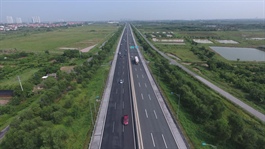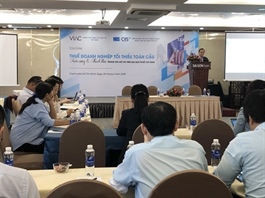Private sector remains driving force for economy
Private sector remains driving force for economy
The private business sector has been an important driving force of the economy and is expected to raise GDP contribution to 55 per cent by 2025, a top economist told the second Private Economic Forum 2023 in Ha Noi on Sunday.

|
Can Van Luc, chief economist at BIDV and member of the National Financial and Monetary Policy Advisory Council, told the event, organised by the Viet Nam Private Business Association (VPBA) that after nearly 40 years of renewal, the private economic sector has had many strong brands, making an important contribution to the country's socio-economic development.
A number of large-scale, multi-industry private economic groups have been formed, which are capable of competing in the domestic and international markets.
In terms of quantity, the private sector accounts for about 98 per cent of the total number of over 800,000 operating enterprises; accounting for about 85 per cent of the total number of employees in the country, including the individual economic sectors.
In particular, the private sector makes a large contribution to the State budget rising from 13.88 per cent in 2016 to 18.5 per cent of total budget revenue in 2021 and accounts for about 35 per cent of total import turnover and 25 per cent of total export turnover, nearly seven times higher in terms of import and 10 times in export compared to the State-owned enterprise sector.
Capital from the private sector also makes a great contribution to socio-economic development, increasing the social investment capital from 51.3 per cent in 2016 to 59.5 per cent in 2021.
In addition to highlighting the results and contributions of the private sector, Luc and other delegates also pointed out shortcomings and limitations.
Although the private sector contributes a large proportion to the GDP, about 46.4 per cent, the growth rate of the private sector tended to decrease in recent years and failed to reach the target of 50 per cent by 2020 according to Resolution 10-NQ/TW.
In addition, the private economy is mainly small and micro-scale, most of which are still household businesses, accounting for 94 per cent.
The level of technology, management, financial capacity, product quality and competitiveness are still low.
Industry structure is still unreasonable as well as lack of links with each other and other economic sectors.
The capacity for international economic integration and competition is still limited, and the level of deep participation in regional and global value chains is still low. The private sector, especially private enterprises, always lacks capital.
Chairwoman of BRG Group Nguyen Thi Nga said that a business that wants to succeed not only needed aspirations and passion, but the business itself needed to have the capacity and careful preparation.
In particular, the businesses must always put people at the centre, which was an important asset for success and development, noted Nga.
They must make efforts to improve the working environment, share information, benefits and responsibilities with employees, and always ensure the interests of employees at the best level, added Nga.
She also said that the entrepreneurial team and each enterprise must be properly, fully and deeply aware of the rights, obligations and responsibilities of their entrepreneurs and businesses in the process of innovation and development of the country.
In addition, it was also necessary to pay special attention to promote digital transformation, invest wisely in the application of information technology to improve the efficiency of business administration at enterprises, she added.
Capital for private enterprises was also a big issue attracting many opinions at the discussion.
Cao Tien Doan, Chairman of Thanh Hoa Business Association, said that although the issue of access to capital for private enterprises in recent years had been regulated quite specifically in many legal documents, in fact, the access to capital of enterprises still faced many difficulties and obstacles.
The chairman and a number of businesses suggested that the banking industry promptly solve outstanding problems, helping businesses easily grasp and access capital sources.
Along with that, they asked banks to continue to promote administrative reform, especially improving process, simplifying lending procedures, strengthening the application of information technology in management, analysis and prevention of risks.
Joint stock commercial banks should regularly organise training courses to improve professional capacity of staff in charge of credit and loans to advise and support timely, safely and effectively businesses when in need of loans, said Doan.
In addition, business representatives also recommended strengthening inspections and reviews of internal processes and regulations, early warning of potential risks to have timely preventive and handling solutions, helping businesses limit possible damage.
At the same time, there should be a mechanism to closely monitor and inspect the implementation and have strict sanctions to avoid taking advantage of or improperly implementing the loan policy for self-seeking purposes.

























